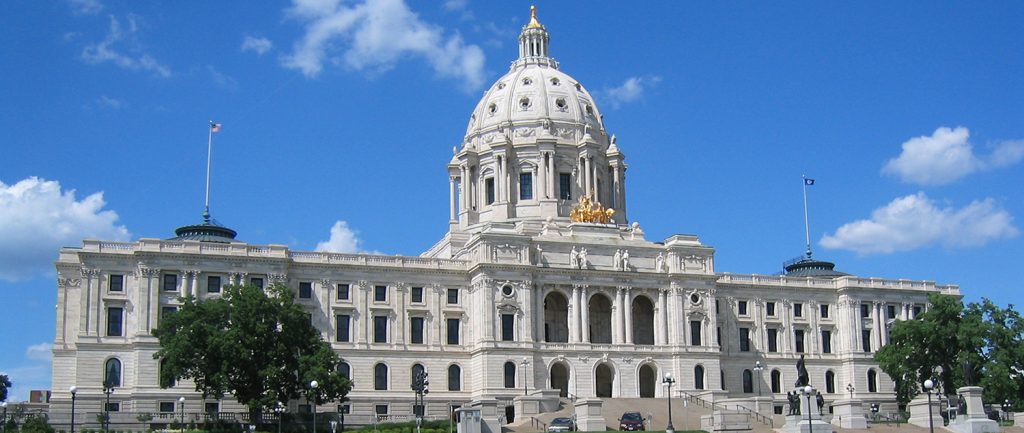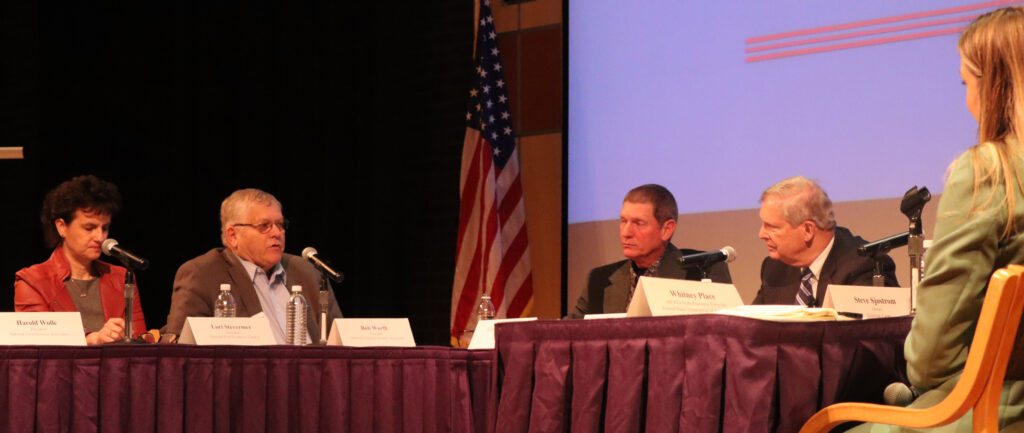Bob Worth has met his share of important people and shook many hands during his 13 years visiting Washington, D.C. on behalf of the Minnesota Soybean Growers Association (MSGA) and the American Soybean Association (ASA).
This week, Worth was present for another milestone meeting: this time at the Japanese Embassy, where Worth and MSGA directors met with Japanese trade and agricultural officials for the first time in a step towards strengthening trade relations between the nations.
“To come from a small town in southern Minnesota and be here on Capitol Hill, it’s an honor and a privilege,” said Worth, who’s in his second year as MSGA secretary. “And the visit to Japan Embassy was quite a unique experience. It all comes down to making contacts with trade partners on behalf of our growers.”
Japan has been a longtime purchaser of U.S. soybeans. In 2017, the country imported more than $1 billion worth of whole soybeans and soybean meal combined. Japan imports many commodities from the U.S. (namely soybeans, corn, beef, pork and wheat) and is the fourth largest global market for United States agriculture, importing more than $11.3 billion in 2018. Its food self-sufficiency ratio is also the lowest of any developed country, partly due to aging population and limited geographical space for agriculture (Japan is about the size of Montana and has a population of about 126 million).
MSGA recently submitted comments to the World Trade Organization to remove the non-tariff barrier on a subject document that was submitted by the Japanese government. By removing the non-tariff barrier, the resultant shipments of U.S. commodity soybeans from Pacific Northwest (PNW) ports to Japan would increase the prices received by farmers in Minnesota (and the Dakotas) for their soybeans.
With Japan and the United States discussing a bilateral trade agreement, MSGA Executive Director Joe Smentek said the time was right for Japanese officials to meet Minnesota farmers and discuss the low foreign material content and superior quality of northern soybeans.
“We were thrilled the Japanese Embassy welcomed us in for a meeting during our short time in Washington, D.C.,” Smentek said. “For our farmers to be able to meet with Japanese officials face-to-face is a great first step.”
Joining Smentek and Worth were MSGA President Michael Petefish and Vice President Jamie Beyer. Meeting the Minnesota delegation were Embassy Counselor Hiroaki Kojima and Japan’s First Secretary for Agriculture Takuma Nakagawa.
Petefish discussed with the Japanese officials the importance of trade to Minnesota farmers; prior to the dispute with China, the state’s soybean industry exported more than $2 billion each year.
“Soybeans travel a lot,” Counselor Kojima said with laughter.
“And we’d like to work with your country to keep them traveling,” Petefish said.

Takuma said he hopes both countries can start trade negotiations within the coming month, but that could be delayed due to the government shutdown and the current trade war with China. In December, Minnesota Soybean Research & Promotion Council (MSR&PC)’s Tom Slunecka testified at a public hearing on the Japan-U.S. trade agreement.
At the conclusion of the meeting, Worth invited Japanese agriculture leaders to visit Minnesota farms.
“I think you’d be very pleased by what you see on our farms,” Worth said.
After exchanging gifts with the Japanese, the farmer leaders departed the meeting buoyed by the prospect of greater trade relations with Japan.
“The meeting went about as well as any of us could’ve expected,” Beyer said. “It was a first for all of us. Most importantly, the Japanese were able to put a face to U.S. and Minnesota agriculture.”
Across town
After the visit to the Japanese Embassy, MSGA leaders traveled to U.S. Department of Agriculture (USDA) headquarters with Farm Service Agency (FSA) agency Richard Fordyce, a former United Soybean Board director. The group discussed the state of the agriculture economy, the Market Facilitation Program (MFP), the Trump administration’s proposed USDA budget cuts and Farm Bill implementation.
Fordyce estimates farm bill sign-up will begin sometime in 2019.

“We have a secretary (Sonny Perdue) and undersecretary (Steve Censky), who demand this gets done sooner or later,” Fordyce said. “We have a lot of career folks here at USDA, who are just incredible and are doing everything they can to get the Farm Bill rolled out.”
Fordyce later brought in FSA’s Brad Karmen, who’s worked on seven farm bills through a 40-year career.
Petefish spoke with Fordyce about the pain caused by the nearly year-long trade dispute with China. Fordyce said he’s cautiously optimistic a trade deal will be reached.
“For us, some of the damage isn’t recoverable,” Petefish said. “China’s now looking at other parties for their soybeans, and that’s scary.”
On the Hill
During the final day in D.C., 10 Minnesota soybean farmers from both MSGA and ASA met with staff of 10 representatives. As another byproduct of the historic government shutdown, Congress’ schedule was altered and its members were out of session this week.
“It was unfortunate we weren’t able to speak directly with legislators, but we thank all of the legislative assistants who took time to meet with us,” Smentek said. “Our farmers made the best of the situation.”

Trade, once again, was at the forefront of the discussion with legislative assistants. Other topics included the MFP, extending the biodiesel tax credit, transportation, infrastructure and rural broadband.
“The MFP was the difference between some farmers going from red to black,” MSGA Director Chris Hill told Adam Schiff, Sen. Tina Smith’s Agriculture Legislative Assistant. “You all realize the farm economy is tough, and that made a big difference.”
Hill, who also serves on the National Biodiesel Board, spoke with legislative assistants about renewable fuels.
“Biodiesel is great for the economy, great for the environment,” he told Rep. Jim Hagedorn’s staff. “It’s a win-win.”
Petefish said although it was a disappointment the legislators were back in their districts, it gave farmer leaders an opportunity to have face time and build relationships with their respective staffers.
“We saw some familiar faces and met some new ones, which is really important,” he said. “From making friends at the Japanese Embassy to telling our story to staffers, we made progress for our members this week.”




